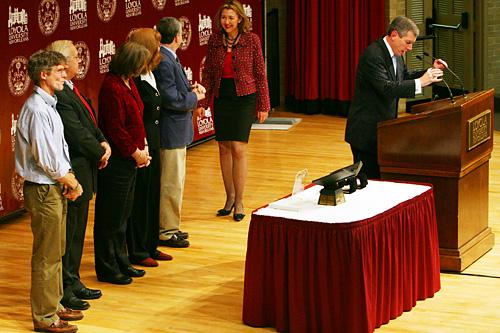The Rev. Kevin Wildes’s spring convocation speech emphasized Loyola’s past achievements, and the improvements necessary to adhere to the university’s mission.
Students, faculty and staff filled Nunemaker Hall Friday, Jan. 23 to hear the university president highlight both long-term goals, as well as specific plans for the coming year.
“It is worth noting that we have accomplished a great deal,” Wildes said.
He pointed out Loyola’s rankings in U.S. News & World Report and in the Princeton Review as proof of the strides that the university has taken, as well as the 13 percent increase in freshman applicants for the coming year and 30 percent increase in campus visits.”We expect the fall class of next year to be as academically strong as this class and we expect them to be more geographically diverse than we have had,” he said.
In addition to undergraduate admissions, projected improvements in retention and the development of Loyola’s graduate programs were mentioned as crucial to Loyola’s success.
These changes hinge, however, on more expansive goals.”The challenge before us, simply put, is to choose and create our future,” Wildes said.The plan for development, he noted, consisted of several major parts, the first of which is the task of preserving Loyola’s Jesuit and Roman Catholic identity, both within the classroom, particularly through the common curriculum, and in the community.
“The two ought to be seamless and present our students with opportunities for continuous learning in this tradition,” he said.The second challenge is to determine the right size for the university. Specifically, to choose the appropriate areas to enhance the undergraduate and graduate programs, he said.
“Where are the opportunities for us in the university to expand?” he asked.
The third facet of the plan is to understand the ways in which Loyola can take advantage of its location within a city Wildes described as a “living laboratory,” where citizens are given the opportunity to find ways to help rebuild.
“Many of us — faculty and staff, and our students — are happily engaged in the renewal of the city,” he said. “We can always ask, however, how we can better bring our intellectual capital and our expertise as a university to be of service in helping to renew this city and its pressing social issue.”
Another major aspect is to uphold the importance of teaching and research.
“Our mission and our identity shape the purpose of the education we offer. It is to help our students grow and mature and transform themselves and our society,” he said. Wildes emphasized the significance of the university’s large number of students who are the first in their family to attend college. Loyola has almost twice the national average with 30 percent of undergraduates who are first generation students.
On a greater scale, he noted the importance of helping each student finish their studies.”When students and families make a commitment and a financial sacrifice to attend Loyola, we have an obligation to do all we can to make sure they will commence from Loyola successfully,” he said.
Masako Hirsch can be reached at mmhirsch@loyno.edu.






